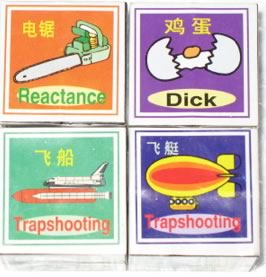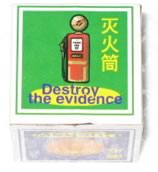February 14, 2008
Egg, penis, whatever
 With respect to the strange Chinese/English children's blocks discussed a few days ago ("A is for Apple", 2/9/2008), Doug Wilson explains:
With respect to the strange Chinese/English children's blocks discussed a few days ago ("A is for Apple", 2/9/2008), Doug Wilson explains:
The really weird ones are apparently from dictionary look-up errors ... not just taking an unlikely choice from the correct entry, but actually reading a different (but nearby) entry. I don't know why this happened, but I picture a Chinese who is utterly unfamiliar with English using a Chinese-to-English dictionary (either paper or digital). If there are hundreds of other blocks which are correct/reasonable and were not shown, then maybe these are just sporadic errors. Otherwise I imagine a corrupt file, illegible book, or unfamiliar interface.
The key point is that the first Chinese character is looked up correctly, but the wrong word is chosen from the list of words and expressions presumably shown under the head character.
For example, for the block that combines a picture of an egg with the English word Dick, Doug suggests that
"ji1 dan4" 鸡蛋 = "chicken egg" was mistranslated using the entry for "ji1 ba[1]" 鸡巴, translated "penis [colloquial]" in my dictionary but presumably translated "dick" in some other ones.
I agree that something like this must have happened -- but the hypothetical Chinese blocks-designer must be not only innocent of English, but also pretty inept at bilingual dictionary usage. Of course, we've seen plenty of evidence that Brits and Americans -- even highly cultured intellectuals -- can be lexicographically challenged in surprising ways. Still, the Chinese seem to be unusually careless in their approach to such things.
[Christopher Neufeld writes to suggest that the whole thing was a joke or hoax:
Engrish is always good for a laugh. It can occasionally provide insight into the mechanics of another language and the perils of electronic (or poorly informed) translation, but as it's grown in popularity, it's started getting photoshopped. The English-learning blocks are plausible except for the last one, "Destroy the evidence." It's the only block featuring a sentence, and the characters also read "destroy the evidence", so it's not just a shoddy translation. Hilarious, but probably not real.
But Doug Wilson responds:
But the characters on the block do NOT read "destroy the evidence"! Did Neufeld read the wrong entry in the dictionary the same as the block-labeler did?
I've found the expressions in question on-line -- and adjacent! -- here:
http://baike.baidu.com/view/828651.html
You see "miehuoqi" = "fire extinguisher"; the alternate form right after the brackets is the form on the block.
And the next entry is "destroy the evidence".
Here's the block in question:

And an image of the relevant online dictionary segment:

I confess that the picture on the block looks to me more like an old-fashioned gas pump than a fire extinguisher, but perhaps that sort of uncertainty is fitting, given the rest of the situation. ]
Posted by Mark Liberman at February 14, 2008 02:11 PM